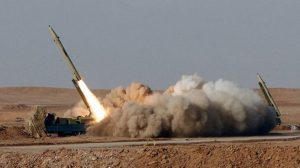North Korea and Iran are spreading fear with their threats. International diplomacy and economic pressure must put an end to this…

(c) Asitimes
Pyongyang̕s ambition of becoming an “invincible nuclear power” is spreading fear. The latest causes for concern were the dictatorship’s missile launches and a hydrogen bomb test. Prime Minister Shinzo Abe said Japan would not tolerate the threat from Pyongyang. The UN Security Council unanimously condemned North Korea’s missile tests and tightened sanctions on Pyongyang.
The U.S. president reacted forcefully, threatening North Korean dictator Kim Jong-un with “fire and fury.” Russian President Vladimir Putin and Chinese leader Xi Jinping, on the other hand, squarely back a political solution. Germany supports a similar approach. Chancellor Angela Merkel has cited the 2015 Iran Nuclear as a possible template.
In that treaty, Iran committed to decommissioning part of its centrifuges for enriching uranium and transferring already highly enriched uranium – which is essential for building a nuclear weapon – to Russia. Also, international observers would be permitted to inspect production sites for potential nuclear weapons zones. In return Western states agreed to release frozen Iranian assets. The treaty has an effective lifespan of ten years.
From the beginning, Iran’s neighbors expressed reservations over the deal, and with good reason. The clearest condemnations have come from Israel and Saudi Arabia, but other Gulf states have also expressed serious doubts. Even under so-called “moderate” presidents, Iran’s clerical regime has always espoused the goal of destroying the Jewish State. Iran also treats the majority-Sunni Kingdom of Saudi Arabia as an enemy power. The nuclear deal with Iran makes no mention of neighboring states’ right to exist, neither Egypt, Israel, Saudi Arabia, or the UAE.
Some breathing space
In Washington, congressional Republicans were joined by some Democrats in expressing serious doubts about the deal. In the end, the treaty was ratified. Iran ceased production of highly enriched uranium. Western states lifted sanctions against Iran and unfroze Iranian assets. Yet Tehran keeps developing and testing medium-range missiles capable of carrying nuclear warheads. The country has redoubled its sponsorship of terrorist groups such as the Shi’ite Hezbollah militia in Lebanon and Hamas in Gaza. Iran is propping up the Assad regime militarily in the Syrian civil war. And, Iran arms the Shi’ite Houthi militia in Yemen, which is fighting the Saudi-backed government there and seeks a guerilla war against Saudi Arabia. All this springs from Iran’s unabashed objective of eradicating Israel and destroying Iran’s Arab rivals Saudi Arabia and Egypt. Also, Tehran keeps threatening to walk away from the nuclear treaty and relaunch its military nuclear program.
When Donald Trump called Iran a ̒rogue nation̕, Tehran demonstratively started a new test missile. Berlin voiced protest.
The nuclear deal with Iran has given the rest of the world some breathing space. However, it is not a role model for resolving the Korea crisis. Indeed, the North Korean nuclear threat is ample reason for the international community to remind Iran and North Korea that they must uphold the 1964 Nuclear Non-Proliferation Treaty – and that the rest of the world refuses to be blackmailed any longer. The best instruments for this continue to be diplomacy and economic pressure. If world powers neglect to resolve this threat today, it will continue to fester tomorrow. The nuclear blackmail will go on – or even lead to war, with unforseeable consequences.■
